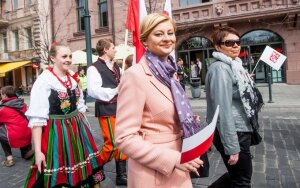- June 13, 2013
- 408
Tamasuniene: We are not a danger to Lithuania

Lithuanian Poles have the right to bring up their children in Polish language, announced Rita Tamasuniene, a starost of a parliamentary faction AWPL (Electoral Action of Poles in Lithuania), reponding that way to the words of Dalia Grybauskaite.
”We are really sorry if the president sees us as a threat to the state and as some kind of threat to the national language. Threats should be seen in other places. A lot of families, young families emigrate. The president says that the emigrants are coming back. Maybe a little. But we can see empty houses in the villages. The emigration wave was very big. Those who have left are not able to raise their children in their mother tongue. And this is really a big problem.” the member of Parliament, Rita Tamasuniene said. The politician added that the local Polish people who have full Lithuanian citizenship also have the right to bring up their children in their mother language and culture.
The president of Lithuania Dalia Grybauskaite delivered an expose in the Parliament two days ago. „The Lithuanian language became a hostage because of the political arrangements of the governing coalition. A controversial Lithuanian language exam divides the country. At the same time, Lithuania school are being closed next to the Lithuanian border. The citizen of Lithuania have to have explained what possible price we will have to pay.” the president accused the current parliamentary majority.
The vice-chairman of the Parliament Jarosław Narkiewicz said in an interview with the PL DELFI that the speech of the president divided society and that she could not maintain neutrality. „The negative part of the message was that she began to divide people in certain issues and play on national – patriotic themes„ – said the MP.
Source: http://pl.delfi.lt/aktualia/litwa/tamasuniene-nie-jestesmy-zagrozeniem-dla-litwy.d?id=61618803
Tłumaczenie by Justyna Kaczmarek w ramach praktyk w Europejskiej Fundacji Praw Człowieka, www.efhr.eu. Translated by Justyna Kaczmarek within the framework of a traineeship programme of the European Foundation of Human Rights, www.efhr.eu.

